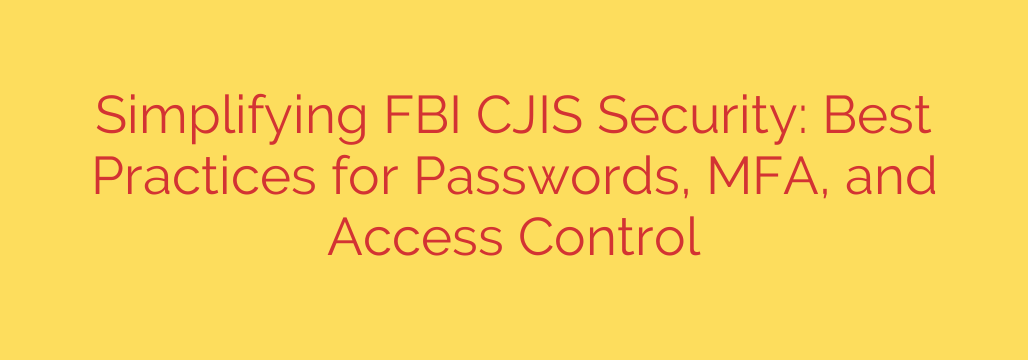
Maintaining the integrity and confidentiality of criminal justice information (CJI) is paramount for law enforcement and related agencies. Compliance with the FBI’s Criminal Justice Information Services (CJIS) Security Policy is not just a requirement; it’s a fundamental responsibility. Ensuring the security of sensitive data involves a multi-layered approach, with foundational elements like strong passwords, multi-factor authentication (MFA), and robust access controls playing critical roles.
Understanding and implementing best practices in these areas are essential steps towards achieving and maintaining CJIS compliance and, more importantly, protecting the vital data entrusted to these organizations.
Strengthening Your First Line of Defense: Passwords
Passwords remain a primary barrier against unauthorized access. The CJIS Security Policy outlines specific requirements designed to enhance password strength and management. Adhering to these guidelines significantly reduces the risk of brute-force attacks and unauthorized logins.
Key password requirements and best practices often include:
- Minimum Length: Passwords must meet a specified minimum length, typically eight characters or more, making them harder to guess.
- Complexity: Passwords should include a mix of character types, such as uppercase letters, lowercase letters, numbers, and special characters. This complexity makes dictionary attacks less effective.
- Regular Changes: Passwords must be changed periodically, often every 90 days, to limit the lifespan of any potentially compromised credential.
- History Enforcement: Systems should prevent users from reusing a certain number of past passwords, typically the last 10 or more, ensuring new unique passwords are created.
- Account Lockout: Implementing policies that lock user accounts after a specified number of failed login attempts helps protect against guessing attacks.
Training users on creating strong, memorable passwords and the importance of not sharing them is also a crucial, often overlooked, component of password security.
Adding a Critical Layer: Multi-Factor Authentication (MFA)
While strong passwords are vital, they are no longer sufficient on their own in the face of increasingly sophisticated threats. Multi-Factor Authentication adds a necessary second (or third) layer of security by requiring users to provide additional verification beyond just a password. This typically involves something the user knows (password), something the user has (like a phone or hardware token), or something the user is (like a fingerprint).
Under CJIS, MFA is frequently required for accessing CJI, especially from outside the secure network perimeter (remote access).
Implementing MFA significantly enhances security because compromising one factor is not enough to gain access. Even if a password is stolen, an attacker would still need the user’s physical token, phone, or biometric data to log in. This provides a robust defense against phishing, credential stuffing, and other common attack vectors.
Controlling Who Gets In: Access Control
Robust access control mechanisms are fundamental to protecting CJI. These controls ensure that individuals only have access to the information and system resources necessary to perform their job duties. This principle is often referred to as the principle of least privilege or “need-to-know.”
Effective access control involves several components:
- User Identification and Authentication: Verifying the identity of every user attempting to access systems or data. This ties back directly to strong passwords and MFA.
- Authorization: Defining and enforcing what authenticated users are permitted to do and access. This involves assigning permissions based on roles and responsibilities.
- Access Monitoring and Auditing: Logging all access attempts and activities. Regular review of these logs helps detect suspicious behavior or policy violations.
- User Access Reviews: Periodically reviewing user accounts and their assigned permissions to ensure they are still necessary and appropriate. Accounts for terminated employees or those with changed roles must be promptly modified or disabled.
- Physical Access Controls: While often digital, CJIS also mandates controls for physical access to systems processing or storing CJI to prevent unauthorized tampering or data theft.
Implementing granular access controls minimizes the potential impact of a compromised account, limiting an attacker’s ability to move laterally within the network and access sensitive data.
A Unified Approach to Security
Effectively securing CJI requires integrating strong password policies, mandatory multi-factor authentication where required, and principle-based access controls. These elements work together to build a stronger security posture, making it significantly more difficult for unauthorized individuals to gain access to sensitive criminal justice information. Prioritizing these fundamental security practices is not just about ticking boxes for compliance; it’s about upholding the public trust and ensuring the safety and integrity of critical data. By focusing on these core areas, agencies can build a more resilient defense against evolving cyber threats.
Source: https://www.bleepingcomputer.com/news/security/fbis-cjis-demystified-best-practices-for-passwords-mfa-and-access-control/








